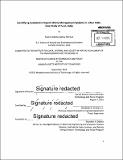Identifying sustainable organic management systems in urban India : case study of Pune, India
Author(s)
Perlman, Rachel Martha Katims
DownloadFull printable version (31.46Mb)
Other Contributors
Technology and Policy Program.
Advisor
Randolph E. Kirchain, Jr.
Terms of use
Metadata
Show full item recordAbstract
With increasing population and per-capita capita waste generation, cities in India and other developing countries are seeking alternative strategies to manage the organic fraction of municipal solid waste in an effort to improve efficiency, reduce costs, and increase environmental performance. This thesis aims to explore the tradeoffs of various organic waste management strategies in the urban Indian context, specifically using a case study analysis of the waste system in the city of Pune. Door-to-door, primary, and secondary collection and four technologies for treating organics (landfilling, composting, anaerobic digestion, and pelletization) are analyzed with regard to cost and environmental performance. Because decentralized waste system architectures minimize transportation and allows wastepickers to maintain jobs, particular emphasis is made in this thesis to understand the cost and environmental implications treatment at a range of scales. To determine the quantity and composition of waste, we conducted waste audits of MSW that was collected from 2,650 households during two different seasons. Per-capita MSW generation in Pune was found to be 134, 309, and 401 grams/day for the lower, middle, and upper income residents, respectively. Of these totals, 80%, 66%, and 69% of the MSW was biodegradable. Given that middle and upper income residents generate 2.3 to 3 times what lower income residents generate, India can expect to see a significant increase in waste volumes as its population becomes wealthier. By comparing the spatial footprints of the technologies at a range of scales, it was found that pelletization of organic MSW (although it is not a fully developed technology) has great potential to reduce the spatial footprint of organic waste management. Cost modeling is used to identify the drivers of cost for each process and to identify the leastcost options. The cost per ton of waste managed using anaerobic digestion, composting, and pelletization decreases significantly with larger scale of treatment. Alternative organics management technologies used at small scales (less than 0.5 TPD) are more expensive than landfilling; however, if a facility of at least 0.5 TPD is used, anaerobic digestion is less expensive than landfilling. Pelletization and composting become less expensive than landfilling at the scale of 5 TPD and 200 TPD, respectively. Although the average cost of centralized organic waste systems is lower, the difference in cost between the lowest-cost decentralized systems and lowest-cost centralized systems was relatively small. A review of the relevant literature is used to identify the global warming impacts of organic waste processing. The global warming potential (GWP) of anaerobic digestion, pelletization, composting, and landfilling is estimated to be -51, -42, 38, and 510 kg CO-eq/ton, respectively. A city looking to minimize its contribution to global warming could achieve significant reductions in emissions by biodigesting food waste and peltetizing yard waste. Such systems would have a net greenhouse gas emissions savings of over 750 tons CO2-eq each year. Of the technologies assessed, anaerobic digestion (at scales of 5 TPD or larger) has the best combination of cost and GWP performance. However, because woody material cannot be digested, pelletization (at 10 TPD plants) has the best combination of cost and GWP performance specifically for handling yard waste. These findings suggest that for handling organic MSW, anaerobic digestion in combination with pelletization produces the best combination of cost and GWP performance.
Description
Thesis: S.M. in Technology and Policy, Massachusetts Institute of Technology, Institute for Data, Systems, and Society, Technology and Policy Program, 2015. Cataloged from PDF version of thesis. Includes bibliographical references (pages 182-191).
Date issued
2015Department
Massachusetts Institute of Technology. Engineering Systems Division; Massachusetts Institute of Technology. Institute for Data, Systems, and Society; Technology and Policy ProgramPublisher
Massachusetts Institute of Technology
Keywords
Institute for Data, Systems, and Society., Engineering Systems Division., Technology and Policy Program.